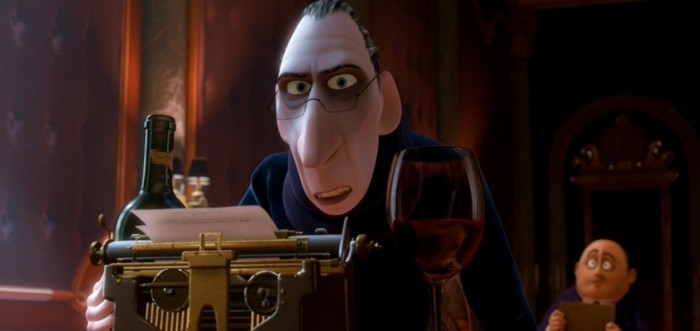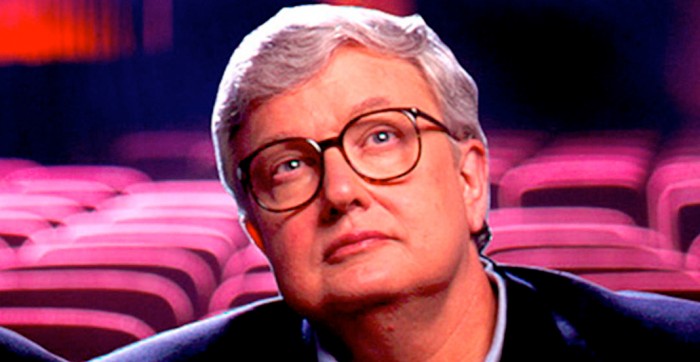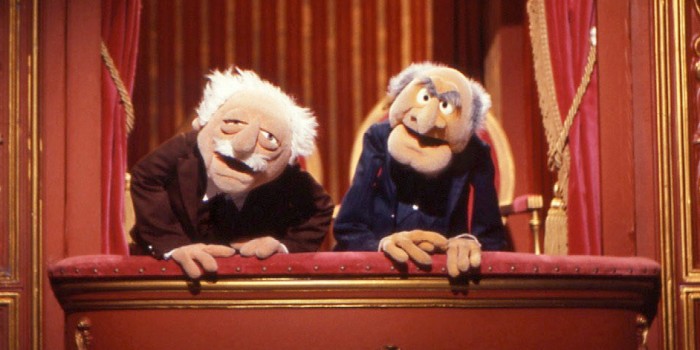'Batman V Superman' Wasn't Made "For The Critics" But What The Hell Does That Mean?
After debuting with the usual preview screenings last night, Batman v Superman: Dawn of Justice is in theaters everywhere this weekend. But before the film had even been seen by a majority of the general public, there was already an uproar on the internet when negative reviews started rolling in. And it wasn't just a few negative words here and there.
Critics have largely been unkind to the film, resulting in a current 30%, with an average 5.1/10 rating, on Rotten Tomatoes (down slightly form earlier in the week), making it worse than the abysmal X-Men Origins: Wolverine. That upset some of the fans who were lucky enough to see it early, as well as tons of fans who hadn't even seen the movie yet. It's par for the course with a comic book movie.
However, this time there was some quick response from director Zack Snyder as well as cast members Ben Affleck, Henry Cavill and Amy Adams about the negative reviews. But there's one particular response to the negative reviews that is really frustrating to see, and it opens up a discussion about film criticism and fandom at large that must be had.
So let's dive into this debate stirred up by Batman v Superman critics and fans below.
Zack Snyder and Batman v Superman Cast Respond to Negative Reviews
First of all, let's take a look at what Zack Snyder had to say in response to the negative reviews flooding the internet. The director is taking it in stride by simply telling Yahoo UK:
"I'm a comic book guy and I made the movie based as much as I could on that aesthetic. And so I don't know how else to do it 100%, so it is what it is."
The tone of his voice in the video where this quote comes from sounds a little sad, which is understandable with some of the things being said about his movie. In the same video, Henry Cavill points out that it's the people heading to theaters this weekend whose opinion matters most:
"What is really going to matter, I believe, is what the audience says, because they're the ones who are buying tickets. The audience's voice is loudest and after this weekend the audience, at least partly, will have spoken."
Amy Adams echoes those sentiments when she says:
"I know that Zack doesn't make the movies — or none of us are making the movies — for the critics," she said, adding that fan responses so far have been positive and articulating that they're "making the films for them."
It's fine that Zack Snyder and his cast aren't bothered by what critics have to say about Batman v Superman, or any of the movies they make. They're artists, and they're better off doing what they want to do, regardless of what critics say. But that doesn't mean what critics say should merely be disregarded or taken as inconsequential by audiences. Furthermore, this differentiation between critics and the general audience is unnecessarily divisive and not representative of the fact that critics are movie fans just like you.
Because of these responses, I think it's important to clarify some statements, accusations and assumptions that have been made from a variety of moviegoers when speaking about critics in general, specifically with regard and in response to the reviews they have written after seeing Batman v Superman: Dawn of Justice. (Although this is something that happens all the time when audiences have a preconceived notion or excitement about any given movie.)
A Movie Review Is Inherently a Subjective Opinion
It's crazy that this has to be pointed out, but believe it or not, there are some people who just don't understand that any movie review written by a critic is not meant to be representative of an entire population, and it's not meant to be the definitive final word on any film.
Readers must remember that each declarative statement written in a review which gives a verdict on any given element of a film (a performance, the score, cinematography, the screenplay, or anything viewers see and hear on screen) is inherently an opinion. Phrases like "In my opinion," or "I think," are not always included because that would be repetitive and unnecessary, especially when it's implied by the fact that the piece you're reading is, by definition, someone's own personal thoughts and opinions on a film.
The function of a movie review is to give the personal impression of a given writer's experience with a film, indicating what they thought was good and or bad. Again, that doesn't mean that readers have to agree with what critics write, because they can form their own opinion. However, it's probably best that you don't express your own opinion or offer dissension to other opinions after you've actually seen the movie in consideration.
Why Rail Against a Review of a Movie You Haven't Seen Yet?
Fans love to hear when a movie they're excited about is good. For some reason, this is the only time that some readers like to hear from critics. But film criticism is not something that should be enjoyed when a personal opinion or excitement matches up with what someone writes and then disregarded and bashed when it doesn't, especially when it concerns a film that a reader hasn't seen yet.
In the case of Batman v Superman, negative reviews brought a plethora of negative, insulting responses to critics who were just doing their job. My question is, what good does that possibly do? Someone who hasn't seen the movie can't make a real case as to why the movie is good, and yet Twitter, comment sections and other places on the internet are riddled with these pointlessly toxic remarks. And this is where they begin to criticize critics. Some readers think that critics can't handle criticism about their writing, but that's not the case. But if you're going to criticize critics (which most critics care about as much as filmmakers care about critical reviews), there are some points that have been made that just aren't accurate or are simply irrelevant.
Does It Matter That Critics See Movies for Free?
For some reason, readers or filmmakers trying to disregard the significance of what critics write about a given movie feel the need to point out that it's the people who pay for tickets whose opinion actually matters. That's just another way of saying that general audiences are more important than critics, which is again a differentiation that is unnecessarily divisive, but we'll get to that later.
More often than not, this point is brought up when readers disagree with the majority of critics' opinions on a movie. And also more often, it's when reviews are negative. But why should a critic seeing a movie for free make anyone suspicious or adverse to a negative review? Wouldn't you be more suspicious about a critic seeing a movie for free and then giving a positive review? That would make more sense, and that does happen occasionally when readers decide they don't want to believe or buy into a movie that's good.
My question is, where does this assumption of bias come from and why? It's the job of a critic to see a movie and write their opinion on it. Are there critics out there who write positive reviews just so they can get their name on a poster, movie trailer or TV spot? Absolutely, but those critics are easy to spot, and it's not hard to see whose opinions you should take with a grain of salt. If anything, there's more bias from general audiences who are already excited to love or hate a movie, whether it's Captain America: Civil War or the Ghostbusters reboot.
One could just as easily say that because a given viewer paid for a ticket, their happiness after a movie isn't as genuine because they want to believe their money was well spent. Or that their dislike of a movie is worse because they feel like they wasted their money. Those aren't useful or accurate assumptions by any means, but neither is the notion that critics seeing a movie for free influences their opinion in any way.
Critics see movies for free because studios want them to potentially create good word of mouth for a movie. They take a risk that a critic will not like the movie, and that's just how the cookie crumbles. It's the easiest way to get advance buzz for a movie and get as many critics as possible to see it, allowing for a wide variety of reactions and potentially good buzz. But it does not change their opinion in any way, and it certainly doesn't invalidate it. After all, you're not forbidden to enjoy a sandwich just because you get it for free.
Why Should You Care What Critics Think?
Well, the short answer this question is you don't have to. But movie critics see a wide range of movies that most general audiences don't. Some readers think critics get burnt out on seeing movies because they have to watch so many of them. But this is actually what should make people trust critics more. They have a larger sample of entertainment that molds their taste, and this is perhaps why there seems to be a sort of dichotomy between what general audiences and critics think about movies.
Some critics see hundreds of movies each year, not just the ones they want to see. And because of that, they see much more than general audiences do. That gives them more experience with a variety of filmmaking styles, techniques, narratives, etc. So while a movie might feel new and fresh to a viewer, it may also be something that a critic has seen so many times before that it doesn't feel original and lacks impact. It's not because critics are uppity and pretentious or they think their taste is superior to yours. It's just different and more experienced, which again, isn't elitist. In fact, it's this part of being a film critic that gets little indie movies like Attack the Block or or (500) Days of Summer noticed by more mainstream audiences. And by association, it's how some of those indie filmmakers get a shot at directing bigger movies.
Basically, listening to a critic is akin to having a friend who tastes a lot of craft beers or eats out at a lot of different restaurants. Maybe they hate Bud Light because they've tasted better beers. It doesn't mean you can't like Bud Light, but it doesn't make their opinion wrong either. But much like you have friends whose opinion you trust on certain subjects more than others, you have to do the same thing with critics.
Don't Trust the Mob, Find Critics You Identify With
Thanks to sites like Rotten Tomatoes and Metacritic, a lot of investment has been placed in overall percentage ratings determined from a pool of critics' reviews. That's why the 30% score for Batman v Superman has people thinking that most critics flat out hate the movie, with no room to like anything about it. But that's not really true.
While reviews have been harsh about certain aspects of the movie, there's also been plenty of praise for other elements. While one critic might think the story is an convoluted, needlessly complex mess (which this writer certainly agrees with), that same critic might also praise the bold portrayal of Batman by Ben Affleck, the insanity of Lex Luthor as played by Jesse Eisenberg, the sheer presence of Gal Gadot as Wonder Woman, and the rich score from Hans Zimmer and Junkie XL – all things that I personally loved about the movie.
In fact, if you look at the average critic rating of Batman v Superman, at the time of this writing, it's a 5.1 out of 10 on Rotten Tomatoes. That's not great, but it actually paints a better picture than a 30% percentage. That basically means most critics liked about 50% of what they saw on the screen, but also found an equal amount to dislike.
But because of how movie ratings are predominantly presented and perceived nowadays, there seems to be this misconception that all critics think the same, and they do so with a hive mind mentality. This is not just a misrepresentation the individuality that each critic has, defined by their own tastes and experiences, but it's also not a good way to determine whether you'll like or dislike a movie. You need to find a critic you trust.
The best thing that you can do as a reader and movie fan is to read reviews after you've seen a movie, find out which writers have opinions that line up with yours, and then you'll begin to trust that their advance reviews might be indicative of whether or not you'll like a movie. If you're a cinephile, then you probably have friends who trust your taste in movies based on your experience and tastes that they've picked up on throughout the years they've known you. That's exactly how you should treat the opinions of critics with regards to movies, because they're movie fans just like you.
Movies Don't Need to Be Made "For Critics" In Order to Be Loved
Finally, we get back around to the statements that started this whole train of though about criticism. Amy Adams says that Zack Snyder and many of her own colleagues in filmmaking don't make movies "for the critics." That's good, because no critic wants that at all. Filmmaking is almost never good when it's clearly done by committee, and critics don't want to be pandered to in any way. They just want to see a good movie, because they just want to be entertained and moved just like every person who heads to the movie theater.
Nearly all critics don't go into a movie with a preconceived agenda.
Almost all critics go into a movie and want to love it.
They never want a movie to be bad, and just to be clear, I mean that they don't want to come out having the opinion that the movie is bad. Remember that their opinion is not meant to be definitive. Therefore when a critic comes out of a movie and doesn't like it, they're disappointed like any movie fan is when they see a movie they don't like. That doesn't necessarily mean that you have to be disappointed by it too, and it certainly doesn't mean you can't have a completely different opinion. But that also doesn't make the critical opinion wrong.
But let's further extrapolate from Amy Adams' comments. If a movie isn't expressly "for the critics" then that means it's "an audience movie" like Ben Affleck recently said in an interview with Jimmy Kimmel. But why does there need to be a difference between the two when we both want the same thing? Our old friend Germain Lussier asked on Twitter, "Was Argo a critic movie?" Would that mean audiences could not enjoy Argo since it wasn't made for them?
The point is that a superhero movie doesn't have to be inherently dissatisfying to critics in order for audiences to appreciate it and vice versa. We all want quality movies and it's not as if this unnecessary dichotomy of audiences and critics doesn't agree most of the time. Just look at how movies like Deadpool, The Dark Knight, Captain America: The Winter Soldier, The Avengers, X-Men: First Class, Superman: The Movie, Spider-Man and plenty more were received by critics and audiences.
To say that a movie is expressly for audiences it to try and make it critic proof, and in a way, you're putting it in a bubble where the quality of a movie is allowed to be less simply because it's a superhero movie. But a superhero doesn't have to be made specifically for critics in order for them to enjoy it either. The Dark Knight was actually thought to be seriously considered for Best Picture, and Heath Ledger won the Oscar for Best Supporting Actor. There's the best example of a superhero movie that was not only "for audiences" but also "for critics", without anyone coming out and trying to protect it against criticism from either side.
At the end of the day, critics are audiences and vice versa. The only difference is that critics just happen to get paid (usually not very well) to write about their thoughts. That doesn't mean you have to agree with them. It just means they're out there for people to do with as they please. If you want to disagree, cool. If you still want to see a movie yourself after reading a negative review, best of luck. But to say a critic's opinion doesn't matter or to alienate them by saying a movie isn't for them doesn't do anyone any favors.
Why Can't We All Just Get Along?
The point is, we're all movie fans, and we all want the same thing. We're not always going to agree, but that's no reason to completely disregard each other's opinions or make hasty generalizations about a broad group of people, whether they're movie critics or comic book fanboys and fangirls. We can all have meaningful conversations about films, even if we don't see eye to eye.
In the case of Batman v Superman: Dawn of Justice, it seems that we have a movie that will spark debate for years to come, but not one of the opinions that comes from that debate is wrong. The critic who saw 237 movies in 2015 is right, and the book store employee who only watches comic book movies and anime is right. Everything will be fine as long as we keep seeing and talking about movies and respect that we all have different opinions without slinging insults around.







